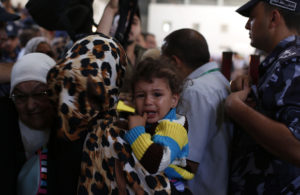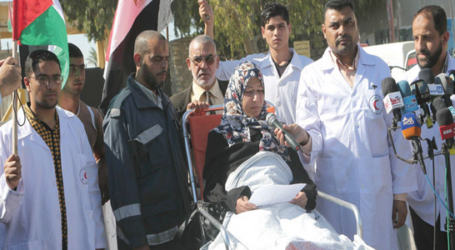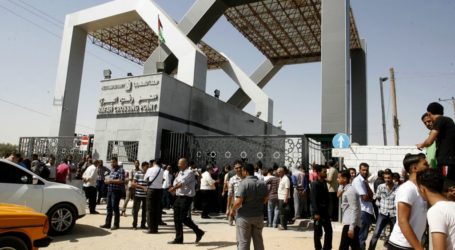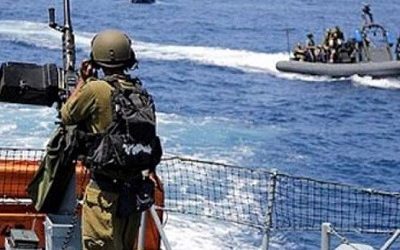Gaza Crossing Briefly Opened by Egypt, But Even Cancer Patients Remain Caged

Rafah Crossing, Gaza, 04 May 1437/12 May 2016 (MINA) – With her papers held loosely in her hands, Wafa Abunukira sits quietly at the crossing point with her husband. For the past 85 days, the 50-year-old mother has been waiting for a miracle, or for the gates to open.
“I have applied to leave via Israel, but was never granted a permission,” Abunukira, a cancer patient whose life depends on medical treatment unavailable in the poorly equipped hospitals of the blockaded Palestinian enclave, told Middle East Eye.
Now her only option is to leave Gaza via the Rafah border crossing with Egypt. When Egyptian authorities announced the crossing would be opened on Wednesday and Thursday, Abunukira was among those waiting patiently at dawn behind the closed gates.
But she is not the only one who wishes to leave, and only limited numbers – usually a few hundred people – are permitted to cross into Egypt daily, even during the rare periods when the border is open. As a cancer patient, one would think she would be a priority, but that is not the case.
Abunukira is one of more than 30,000 Palestinians who are registered with the interior ministry for travel, most of whom have medical conditions, are students or holders of residence permits in other countries, according to Iyad al-Buzum, Gaza’s de-facto interior ministry spokesman.
“I have got a hospital appointment in Israel three times and each time I waited for the exit permit, but then nothing happened,” she said, holding a document showing an appointment for cancer radiotherapy treatment at the Augusta Victoria Hospital in occupied East Jerusalem.
On Wednesday, thousands of people descended on Rafah with the intention of leaving Gaza as the gates swung open for the first time in 85 days, the longest period of continuous closure since 2007 according to OCHA, the UN’s humanitarian affairs office.
“One would think that all nations would recognise the need to fight cancer, but not for those from Gaza,” said Abunukira’s husband, Usama.
“It is catastrophic that Israel has closed the border for humanitarian cases, but it’s a greater catastrophe when Egypt does it,” he said, surveying the scene of human misery through glasses coated with dust scuffed up by thousands of feet.
He has neither the power nor connections to secure a place for his wife in the terminal where the fortunate ones wait to continue their journeys.
“Everyone is a priority here!” a policeman told him as he tried to explain the urgency of his wife’s case.
Lives disrupted by blockade
Here, everyone has a story to tell of lives disrupted by the blockade. Nadine Mohsen, 24, told MEE she was engaged to a Palestinian living in Qatar, but had been waiting for more than a year to get married and settle in Doha.
“Why do they treat us this way? We are neither Hamas nor Fatah,” she said, referring to the two most prominent Palestinian political factions.
Mohsen was accompanied by her mother, who had no visa to get into Egypt. “Is there anywhere in the world where you get stuck and can’t leave?” she asked.
Another 62-year-old mother replied in an Egyptian accent: “Yes, here, and my Egyptian government is the one enforcing the blockade.”
The woman declined to give her name, but confirmed she was Egyptian. She said she was married to a Palestinian man and had to commute regularly to take care of family on both sides of the border.
While the car journey takes about 40 minutes, she can sometimes spend months trapped on either side of the border.
“I appeal to my President [Abdel Fattah al-]Sisi not to allow this mistreatment and humiliation. Open the gates of Rafah now, as we share blood and bread with Palestinians,” she said.
As she spoke, the first ambulance was given a signal to move through the first gate. Clearly, the condition of those inside was more critical than cancer.
There were still more gates to go and three buses stand ahead of the ambulance. (T/R07/R01)
Mi’raj Islamic News Agency (MINA)






